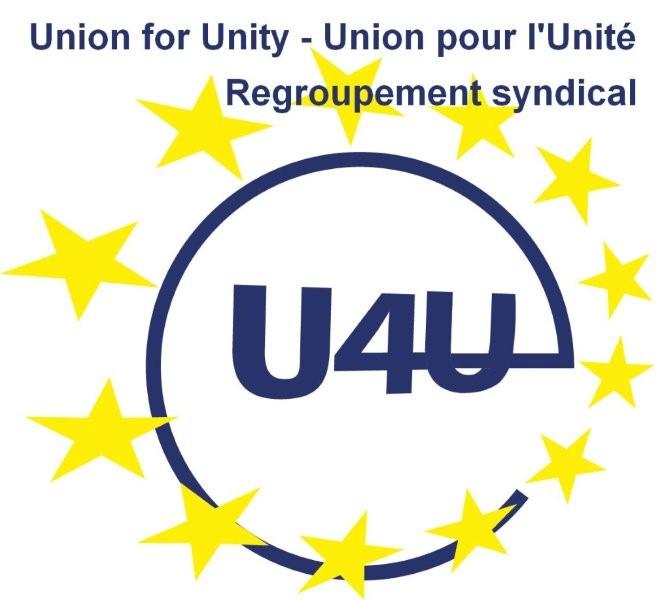
The U4U Circular
![]() - N°55 –
8 April 2016
- Chief Editor: G. Vlandas, Editing
team : P. Kéraudren, K. Slama, F. Andreone, J.-P. Soyer.
- N°55 –
8 April 2016
- Chief Editor: G. Vlandas, Editing
team : P. Kéraudren, K. Slama, F. Andreone, J.-P. Soyer.
 |
The U4U Circular |
|
|
|
 |
The semantic shift of VP Georgieva: from "Doing better with the same thing" to "Doing more and better with less"!When she took up her post, the VP explained to the unions the challenging context of the time. She added that we could no longer expect more resources, but that we would try to do better, which did not mean more, with the same resources. U4U, the reformist union with a European citizen outlook, took the VP at her word and presented her with 15 proposals - after first submitting them to the staff, who largely approved them - for how to "do better with the same thing". There has, as yet, been no response to the call made to the VP for social dialogue on these proposals, which is a shame. This is further evidence of a tendency within our institution to believe that staff have nothing to say, nothing to propose, and that the top-down approach is the only effective option, in spite of the rules of good administrative behaviour and the high level of staff qualifications. [...] This semantic shift is manifested in the Commission's refusal to support the original request to the European Parliament for an upward mid-term revision of the financial perspective. This revision is nevertheless necessary to enable the Union to meet its traditional challenges, to successfully manage the Juncker plan, and above all to tackle the new challenges arising from the current crises, on which the EU will be judged by its citizens. President Juncker therefore correctly assessed the ambitions of his Commission as a last chance that has to be firmly grasped. This new direction risks making things worse, so that we finally end up with "Doing less and doing worse, with less"! U4U understood the initial goal of doing better with the same thing, without its own proposals being heard. It disagrees with a 'lowest bidder' policy that can only make the European construction crisis worse.
|
 |
Social dialogue in the executive agencies: an opening?The meeting between the DG HR and the OSPs on Tuesday 5 April was an opportunity to get an update on the social dialogue problems in the executive agencies. Although the executive agencies have their own Staff Committees, they complain about the lack of information and the lack of time and resources required to monitor staff affairs. Furthermore, as the executive agencies are a recent creation, the OSPs have not yet had the chance to establish a presence there. The discussion resulted in an opinion strongly in favour of the creation of a single Staff Committee for the executive agencies. This single SC would make it possible to pool the problems of the staff and to rationalise both the flows of information on staff policy and the policies themselves: it is inconceivable for each executive agency to apply its own policy. While the DG HR is trying to convince the directors of the agencies and their parent DGs, the OSPs must also tackle the issue from their side and create the conditions for a structured and unified social dialogue within the executive agencies.
|
 |
When will we have a properly structured social dialogue in the decentralised regulatory agencies?Even though the Commission is responsible for monitoring the application of Staff Regulations in the decentralised European agencies (see communication C(2014) 6543 final), the reality is that, in numerous agencies there is still a long way to go in terms of social dialogue. In recent months, three presidents of Local Staff Committees have been threatened or sacked, and numerous colleagues in several agencies report that it is impossible to join a trade union for fear of being harassed or even sacked. It is quite unacceptable for such practices to be tolerated in full view of the Commission, while the Commission sits on the Management Boards of all the agencies and is the guarantor of the application of Staff Regulations and the Charter of Fundamental Rights, which include the freedom of association. Is this an example of double standards? The Commission is threatening Microsoft with sanctions within the framework of competition policy for violating Community legislation, but does not agree to do the same thing in defence of trade unions rights and social dialogue in the decentralised regulatory agencies. For example, although the Commission has only one vote on the Board of Governors of the European Schools, it has considerable influence and is listened to, but it remains completely silent in the regulatory agencies. The result is that the Staff Regulations are not complied with in some of these agencies and social dialogue is ignored. It is up to the Commission to fulfil its obligations and exert its authority!
|
 |
Centralisation of certain functionsThe U4U position on the document "Efficiency and synergies Review. Modernising the HR function"The Commission recently announced that it would proceed with the centralisation of certain cross-cutting functions (HR, communication, IT) in order to rationalise them, and above all to make savings on staff costs in this period of budgetary constraints. The first document on the centralisation of HR ("Efficiency and Synergies Review. Modernising the HR function") was published in January 2016. It announced an ambitious plan to centralise the HR functions, leading to "efficiency gains" of 380 full-time equivalents (permanent posts and other staff on credit), but above all it leaves unanswered numerous questions about the future of the HR staff in the DGs, and about the efficacy of this recentralisation and of the services planned for the Commission's staff, while the possibility looms of this new central HR function becoming an Office. Clarifications of the intentions and methods of implementing this plan are therefore urgently required.
|
 |
Staff management at the Commission: from pessimism to angerFor some years, the Commission has been committed to reducing the size of its workforce on a regular basis to show legislators and the outside world that it can do more with less. Linked to the 2014 reform of Staff Regulations, which aimed to limit the rights and guarantees of the European Civil Service, the principal goal of this staff reduction policy was to cut the Commission's operating costs under heading 5. This policy had an appreciable effect on the services by forcing them to rethink their methods and constantly reorganise in order to deal with the lack of staff. This policy also put a lot of pressure on the staff, with a notable increase in physical and mental health problems. This situation is now becoming even more difficult as a result of hasty decisions, by the Commission in particular, which fly in the face of all the staff planning and task management associated with the staff in post.
|
 |
Guide to teleworkingSocial dialogue updateU4U took part in a dialogue organised by the DG HR for the reworking of the Teleworking Decision that came into force on 17 December of last year. U4U supported the principle of greater access to teleworking for all functions for which it is feasible, without the need for prior consent, for a modern working environment based on trust and helping staff to reconcile their professional and private lives. U4U was particularly keen to eliminate inequalities in career progression and access to training for teleworkers, campaigning for a substantial increase in the number of days authorised for work based on circumstances and promoting a simplified and transparent approval system. The central idea of the mechanism being that the quest for the best possible working conditions that take account of the satisfaction and personal development of the agents could only help to guarantee results of the highest quality. A guide was to be produced to ensure the uniform application at all of the Commission's sites of the advances made with regard to the conception and implementation of teleworking. The earlier period was characterised by the more discretionary application of this teleworking option, as well as by limited computer capacity and strong resistance from some elements of the management to managing staff remotely.
|
 |
The European Parliament is threatening interpreters' leave entitlementsThe European Parliament is imposing new rules that severely restrict the entitlement of interpreters to take paid leave. These rules have not been the subject of any social dialogue and were officially published on Monday 21 March 2016. Parliament cannot exempt itself from negotiating new rules with the unions, in close collaboration with the interpreters' delegation that communicates their concerns. We are asking the Parliament Administration as a matter of urgency to establish a social dialogue on this subject, in which we are ready to take part. It is simply unacceptable for the European Parliament to be able to change the rules in this way without consulting staff representatives, to publish them at such a late stage and to define them in such an exaggerated manner. This constitutes a dangerous precedent: that is why we are appealing for the support and solidarity of the SCIC and all colleagues.
|

|
Basic income: one of the ways to increase European economic and social cohesion and escape from the current economic slump?Conference organised by Graspe and Europe Solidaire, in association with the UEF: 10 May at 6 pm. With the following keynote speakers: Philippe Van Parijs, philosopher, professor at UCL Louvain and Georges Dassis, President of the European Economic and Social Committee (EESC) |